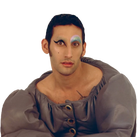Queer and transgender people are still taught to experience shame – here's what you can do to counter this
The social ritual of 'coming-out' – an unnecessary trauma I would not wish on my greatest enemy – immediately equates your first expression of being queer with the feeling of transgression


As a queer person, I always feel a bit anxious during periods like LGBTQI+ History month or Pride. There is this pressure to perform a kind of “happiness” – an enforced celebration of one’s social identity.
Now I’m not discounting the importance of joy in moments of national remembrance, but I was pleased to see the organisers of LGBTQI+ History month claim that this year is commemorating two “sombre” events – the 30th anniversary of the passing of Section 28, a bill that stopped the circulation of materials seemed to be “promoting homosexuality” in schools, and the 40th anniversary of the assassination of Harvey Milk, the first openly gay councillor in the USA.
It’s paramount to constantly explore and expose why it can be so difficult to be a queer person in the world. To me, this seems much more important than the celebration of “how far we’ve come,” which can sometimes chime as a little superficial – it seems to place the routes of our oppression as something of the past, when our current society is still at its core deeply prejudiced. For whilst it’s the case that there are fewer legal violations against LGBTQI+ citizens in the UK, inequality remains deeply systemic. It is entrenched in our social order, its effects are invisible, and it is not eradicated by overnight legislative changes and public sign-postings.
All queer people inherit some form of social shame, and this can be impossible to unburden. When you grow up with a gender/sexuality that is non-conforming, in some way or another, you learn that you have failed at something. Whatever benchmark of assumed identity there is for you in the world, you are told – even subliminally – that you’ve fallen short.
This of course can range in intensity. I personally experienced this in quite extreme ways, having been raised in a conservative-Muslim family where I was perpetually reminded that sexual and gender nonconformism was irreprehensible. But let’s say a family is entirely accepting, it’s still hard not feel like you’ve failed when your TV and film screens are populated with heterosexual and cisgender characters, or when infinite advertising images equate success with nuclear families that would be biologically impossible for you to achieve.
And the social ritual of “coming-out” – an unnecessary trauma I would not wish on my greatest enemy – immediately equates your first expression of being queer with the feeling of transgression; of fessing up to the teacher that you’ve done something wrong.
From the micro-aggressions to these acts of social exclusion, shame can snowball into something gargantuan for queer people, and we carry it everywhere we go – and for the most part, it goes socially unnoticed.
I for one hold a constant anxiety that I am “in the wrong” somehow, and as a result believe most things are my fault. “He dumped me because I was too much”; “that person is ignoring my texts because they’ve realised I’m awful”; “that car across the road beeped because the driver is making fun of my pink socks” – I think if somebody shot me, I’d instinctively want to apologise for running into their bullet. My engrained thought patterns would never allow me to conclude that “he dumped me because he felt insecure”; “they’re ignoring me because they are useless,” or “that driver can’t even see me and is beeping because there is a traffic jam.”
This position of being on the back-foot comes from growing up queer in a world that isn’t designed for you, and chimes with the worrying findings regarding LGBTQI+ mental health. Research by Mind Out revealed that attempts among LGBTQI+ to kill themselves were double as likely as attempts by heterosexual identities in a single year, and four times as likely over a lifetime. Alcoholism and drug addiction are also at least seven times as likely for queer people.
It is the little and constant reminders of our social inferiority that makes being queer so damn difficult sometimes. And whilst commemorating legal victories and historical triumphs are important, I fear that this mutes over the the problems that queer people are experiencing everyday, in sometimes the quietest of ways: the burden of shame that stalks us everywhere we go. So for LGBTQI+ History month, and all proceeding months ad infinitum, what I hope is that everyone checks how their behaviour might add to the cacophony of mental anxieties for LGBTQI+ people around them.
If you work in casting or advertising, think about how your biases might subconsciously exclude queer people from social structures. If you’re just a person talking to a new person, and decide to pry about their life love, don’t make any assumptions with your language about who they are dating. When in doubt, use a they pronoun. If you’re a parent, relative or friend to a queer person, make sure that you relay no disappointment or unease when somebody “comes out”.
For it is these little things that grow into big things that can make the mental chaos of being queer sometimes unbearable. We all have a responsibility to check how our behaviour might make LGBTQI+ people feel ashamed to be themselves. If you’re not making the effort on a daily basis, then, well – shame on you.
Join our commenting forum
Join thought-provoking conversations, follow other Independent readers and see their replies
Comments
Bookmark popover
Removed from bookmarks